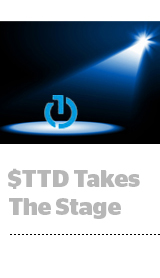The Trade Desk reported Q2 revenue of $72.8 million, a 54% year-over-year increase from the same period last year, and upped its full-year revenue expectations to at least $303 million.
In The Trade Desk’s Q1 earnings report, it raised 2017 revenue guidance from $270 million to $291 million. The continued growth was driven by mobile advertising, said founder and CEO Jeff Green.
But runaway growth in one channel is less important than diversified growth, Green said, citing gains in native, connected TV and audio. Third-party data use on the platform, which boosts the value of accounts once they’ve been won, has also increased 72% compared to last year.
Green also attributed the unexpectedly strong growth to another factor: consolidation among demand-side platforms (DSPs). He said other independent marketplaces have sought exits at prices that could be seen as “capitulation.”
DSP consolidation has taken the form of M&A, illustrated by Sizmek’s acquisition of Rocket Fuel and Amobee’s purchase of Turn. Tremor Video also sold off its buy-side business for $50 million earlier this week, while Rubicon Project shuttered its demand side in January.
Supply-side trends such as header bidding place a huge cost burden on DSPs, which must evaluate more impressions and place more bids. Agency trends around transparency and media margins also add pressure, Green said. These burdens act as a moat that discourages potential startup challengers, even as many standing rivals with meaningful scale leave the open market.
“This is land-grab time,” Green said.
Marketing clouds and telcos have snapped up DSP footholds, but for The Trade Desk, that land grab materializes in the form of operating expenses, which grew from $32.1 million in Q2 2016 to $53.1 million this year.
The Trade Desk has won over more Wall Street investors than other ad tech companies, with analysts from firms like Jefferies, Susquehanna and Zacks significantly raising their price targets since the company’s IPO. But with the utter dominance of Facebook and Google and The Trade Desk’s stock plateauing between $50 and $55 over the past three months – well above a $30 IPO-day price that was considered optimistic at the time – some investment analysts are concerned about the company maintaining its position over the long term.
The Trade Desk’s stock price dropped more than 7% to about $50 at the end of trading. In after-hours trading, shares bounced back to the previous day’s close of $54.













